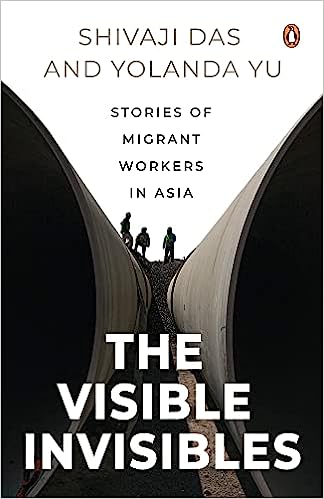As the first wave of the pandemic hit India, back in 2020, besides the movement of the dreaded virus, there was another movement that opened our eyes and exposed the plight of millions of citizens, invisible to our eyes earlier. As migrant workers moved to their villages and hometowns from the metro cities, the stark ruthlessness to which humanity is exposed was laid bare. The Visible Invisibles: Stories of Migrant Workers in Asia by Shivaji Das and Yolanda Yu (Penguin, 2022) is also a story of migrants. These are migrants who are currently based in Singapore. However, the emotions they experience, the gross human callousness that they are subject to, and the sheer apathy in regarding them as basic human beings, is a theme that seems to be pervasive even in their stories.

The authors wanted to explore if our perceptions of migrants influence the policy decisions taken which impact them deeply. If we, as society, consider these migrants ‘invisible’, then how can we policy makers take decisions for their betterment? Migrants are the cogs in the wheels of the lives we enjoy in cities and towns. As long as things go on smoothly, it’s all fine. However, it is when this crucial group is absent, and something disrupts the smooth flow of our lives, that we realize they exist.
The 45 life stories depicted in the book bring out a vast gamut of emotions and themes. The authors held interviews with forty-five current and former migrant workers who worked across different fields such as construction, sex work, retail, hotel industry, domestic services, marine and so on. The workers belonged to various south-Asian nationalities. Understandably, their diverse experiences capture many themes such as glaring inequality, power imbalance, love, yearning for home, alienation, response to cultural contrasts, race relations, inequality, problems of access, mindsets and many more.
One of the mistakes we often make is to group the migrant experience under one umbrella and assume that they all have similar concerns. While there are common threads, the truth is that each experience is a diverse and unique human experience. Some stories highlight the sheer poverty and familial conditions that make individuals work in less-than-ideal conditions abroad.
A glaring theme that emerges from these stories is the lack of regard for the physical and mental health of those who live away from home. There are stories that will show how job-injuries and accidents at the workplace, have completely squashed the hopes of the affected migrant workers. With callous employers and no safeguarding insurance policies, they are doomed to a life of poverty. The vicious cycle of poverty that they just cannot seem to exit is a central theme. “Every domestic worker lives in two worlds. There is the employer’s world; where we work, learn to adapt to their culture, have to respect them and listen to them. But we also have our inner world; the place employers don’t know about, our sadness, our missing our children, our anger, our fights with friends,” says one of the interviewees, highlighting the mental trauma that they live through day by day.
A particularly poignant story is of a Filipino domestic worker who escapes a bad marriage, works initially in Saudi Arabia, then in Singapore and finally finds love there. However, the sense of guilt and sacrifice at having left home to work and the sheer helplessness of the situation, is enough to move the reader into tears.
There are a lot of eyes that this book can open. On one hand, it is a platform for the expression of inner lives and the authentic struggles of the migrant workers. It exposes callousness and disregard of common people who go about their comfortable lives without a thought to this form of modern slavery and abuse that they may be a part of. Even if it impacts a small change in the way common people treat the migrant workers them, it would probably add up to a lot!
Perhaps the essence of their experience is best expressed in the following lines from a poem, written by a former migrant worker N Rengarajan, who migrated from India to Singapore.
“Ours is not a foreign life
Our lives are foreign to us”
The systems have failed migrants. But it need not continue that way. This book could be a starting point for awareness and change. When there is understanding, at the political level especially, there is agency and this paves the way for structural and policy changes. The stories in this sensitive, honest and poignant tome bring to the surface the inner lives of migrant workers. The invisibles become visible. It is up to us to ensure that they always stay that way!




